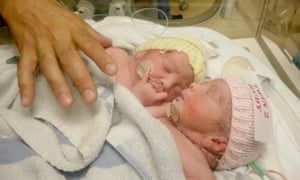When the scientific research backs one’s hunches, when the data strongly suggests that one is on the right side of history in a family argument, it’s always encouraging, a morale-booster. So I was delighted to read on Friday morning of a report published in Biology Today of research conducted by a team of neurologists at Newcastle University confirming that misophonia does exist. It is that acme of modernity, a thing.
Misophonia, hatred of sound, is a 21st-century ailment, the term first being used by audiologists Pawel and Margaret Jastreboff in a paper in 2000. And it is a modern condition which caused no end of aggravation in my attempts to host a family meal in the new millennium. When our twins, Daisy and Freddie, were in their early teens, the serving of, say, Sunday lunch would be quickly followed by first Daisy – and, often swiftly thereafter, her brother – running screaming from the dining room.
In any list of parenting rules “the family that eats together stays together” is usually in the top five, often on the podium. It provides a reliable, and easy, chapter for the “how to parent” practitioner and reams have been written on the subject. With luck, Dr Sukhbinder Kumar’s report might give them reason to pause.
It certainly provides some solace for those of us whose attempts at starting, let alone completing, a Sunday roast for all the family unravelled – as they used to in our household – with the twins, heads in hands, attempting to evade the cacophony of sound allegedly emanating from my whereabouts as I attempted to complete my first mouthful of chicken.
A ridiculous state of affairs which made for, quite simply, impossible eating conditions and which chipped away at my fragile confidence in my cheffing abilities. No one wants the food they serve up to cause so much, and such evident, physical pain. Sunday lunch is meant to be a convivial affair.
But so it goes. All I was trying to do was serve up a roast chicken for my family, the minimum anyone can demand as their lot in life. But, at its most extreme, simple plating up was sufficient to trigger the twins’ misophonia. The mere prospect of my eating sometime in the near future being more than sufficient for at least one of them to get the hell out of Dodge. And while the twins being absent was preferable to them being present and in pain, the whole palaver was sufficient to render me incapable of eating.
Ninety-three per cent of people who were suffering from it claimed that eating, breathing and chewing were the trigger
They had effectively neutralised what made them anxious, but the anxiety induced by the threat of what had been neutralised was so great that they were incapable of hanging around for long enough to discover that they had nothing to fear any more.
The fear of fear itself was so strong as to prevent them discovering that they had nothing to fear … but the fear of fear itself … of course. And so the mind goes.
Things are much better now that the twins are in their twenties. We merrily have Sunday lunch in front of the telly, watching MasterChef on the iPlayer, plates on our laps. A complete no-no in the parenting manual maybe, but it works for us. Watching other people cooking distracts from any gannet-style sounds that may, or may not, be being made by certain people eating.
Kumar sees further improvements to come. “In my laboratory we are interested in how the brain processes emotions, particularly from sound,” the doctor tells me as his findings are published.
“We started with a study published in 2012 in the Journal of Neuroscience into harsh sounds – like chalk on a blackboard – and recorded the subsequent brain activity in 15 or so people.”
The results were unexceptional: an unpleasant sound sounds unpleasant. It was the response that was interesting, because a swath of people contacted Kumar to ask him if he had also investigated the effect of eating and breathing and chewing. All of which are prime triggers for misophonia.
“My laboratory is headed by Professor Tim Griffiths, who is also a neurologist,” says Kumar. “So as a first step we invited a group of four people to attend the clinic he runs. After the interviews, we were really surprised to see how homogeneous the symptoms were and how similar were the triggers.”
They investigated further. “Ninety-three per cent of people who were suffering from it claimed that eating, breathing and chewing were the trigger, and anger and anxiety the dominating emotion triggered,” Kumar says.
For the misophoniac, someone eating can cause an intense fight-or-flight feeling. With hindsight, I can be grateful that one or other or both of the twins didn’t stave my head in as I was concentrating on my chicken rather than run screaming from the room.
Kumar carried out his tests and the results revealed that “the average age when people notice their symptoms is 12 and it tends to start with the focus on a particular family member, perhaps a daughter with her father, and then gradually expands to other people. It is not the loudness of the sound per se which is the trigger, but the way in which the sounds are interpreted and the meaning attached to them. It is the perception of the sound rather than the sound itself.”
The science is in. Bingo! I am not a gannet.
And, double bingo, neither of the twins’ misophonia is particularly acute, in that it hasn’t expanded to that many other people. They can, for instance, sit happily opposite a boyfriend/girlfriend open-mouthedly chomping away without flinching. Not all misophoniacs are so fortunate. Some cannot even go into work, so great is the distress caused by the trigger sounds that they might encounter. Others cannot go to the cinema for fear that, in the dark, someone might crack open the popcorn. They have no option but to see unpopular films at unpopular times.
They will be relieved, however, that their anxiety has a physical base, that it is caused by abnormal connections between this frontal lobe area and an area called the anterior insular cortex, which means that for sufferers a sound is amplified in both, whereas for others any increase in activity in the anterior insular cortex is balanced by a diminution in the frontal lobe.
“A lot of people will remain sceptical”, says Kumar, “but our data will help convince people that something real is happening in the brain.”
The next steps are to discover the exact nature of the activity being produced and to search for possible therapeutic cures. At present the misophoniac has to self-medicate via canny use of headphones or evasive action. God knows what they did before Sony Walkmans.
All data, of course, is double-edged and Kumar’s findings may well be taken advantage of by the nation’s gannets. There are people who cannot eat softly. And as lunch has moved, depressingly and relentlessly, from El Vino’s to El Desko, some think it socially acceptable to hover over their Tupperware – nearly always containing tuna – making the most godawful sounds. They now have an out: “Nah, mate, I think you’ll find it’s you that’s got the problem. Seriously, have you thought about seeing someone about your misophonia?”
MORE UNUSUAL SYNDROMES
Paris syndrome
A form of depression that affects some visitors to Paris. It is most noted among Japanese tourists, who arrive with a romantic view of the city, only to find it does not meet their expectations and that Parisians can be rude. In 2006 the BBC reported a dozen or so Japanese people having to be repatriated each year as a result of delusional states and depression caused by Paris syndrome.
Alien hand syndrome
Individuals experience sensation in both hands, but find one of them (usually the left) acting of its own accord. The syndrome can happen after brain surgery or a stroke. The “alien” hand can do complex tasks: undo buttons or remove clothes. Some individuals have been slapped or punched by their own hand.
Alice in Wonderland (Todd’s) syndrome
This condition, which sufferers usually grow out of in their teens, distorts perceptions, making objects or parts of the body appear smaller or larger than they are. Episodes normally last less than an hour.
Jerusalem syndrome
Visitors to the city experience religious delusions, such as the belief that they are a Bible character. In one case an Irish teacher arrived at a Jerusalem hospital convinced she was about to give birth to Jesus, when she was not even pregnant. The phenomenon can affect individuals of various religious backgrounds, but they normally recover after leaving the city.
Glass delusions
Sufferers believe they are made of glass and at risk of shattering. It was common in the 17th century, when clear glass was new and considered magical, but there are still rare cases today.
Foreign accent syndrome
Individuals suddenly find their voice taking on a foreign accent, usually as a result of a stroke. Between 1941 and 2009 there were 62 recorded cases.
Rebecca Ratcliffe
My twins couldn’t bear the sound of me eating lunch. Now we know why

